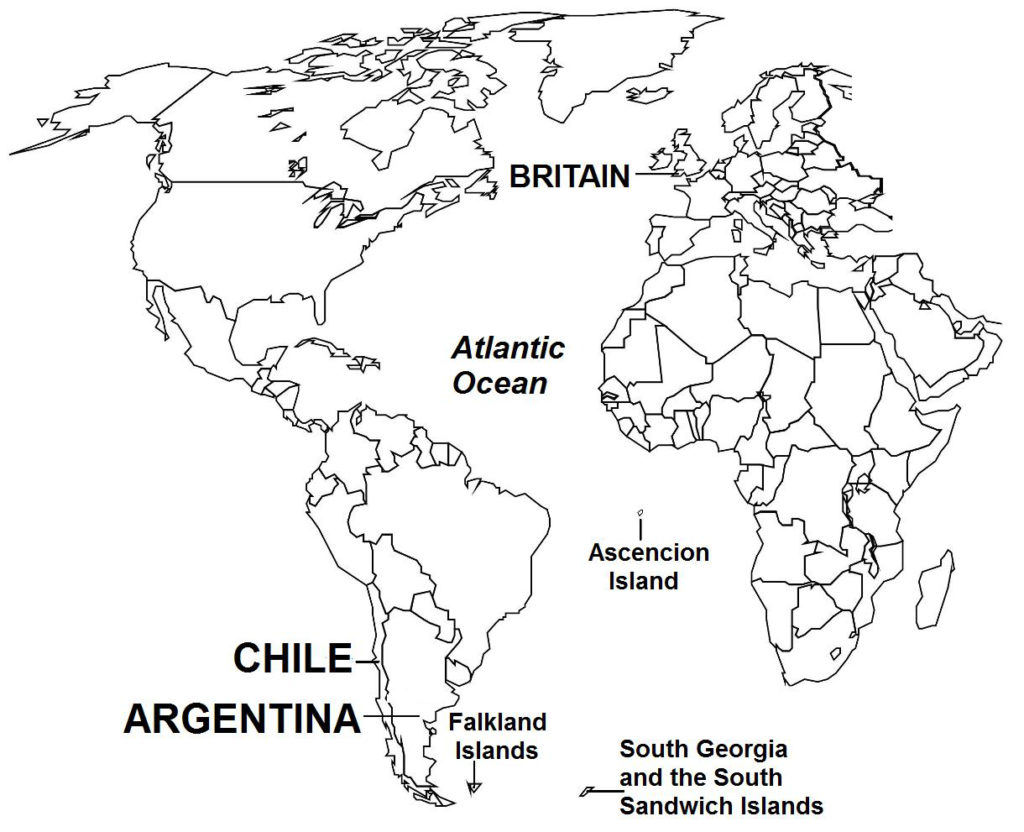By March 1982, the Argentinean military had completed its invasion plan. Occasionally, Argentinean officials made hinted references to the invasion, which apparently were overlooked by the British government.
The invasion plan called for Argentine forces first seizing South Georgia Island, located northwest of the South Sandwich Islands. On March 19, 1982, Argentinean contract workers in South Georgia Island raised the Argentine flag. On April 3, fighting broke out between the Argentinean invasion force and the small British garrison defending the island. The British inflicted some material damage to the invaders, but were overwhelmed and forced to surrender. South Georgia Island then came under Argentinean control.
The invasion of the Falklands began on April 2, 1982, with 100 Argentinean commandos landing at Port Stanley, the capital, ahead of the main force of 2,000 soldiers who later were landed amphibiously. After some skirmishes, the island’s British garrison of 60 soldiers surrendered, and the Falklands came under Argentine control.

(Taken from Falklands War – Wars of the 20th Century – Volume 3)
Background In early 1982, Argentina’s ruling military junta, led by General Leopoldo Galtieri, was facing a crisis of confidence. Government corruption, human rights violations, and an economic recession had turned initial public support for the country’s military regime into widespread opposition. The pro-U.S. junta had come to power through a coup in 1976, and had crushed a leftist insurgency in the “Dirty War” by using conventional warfare, as well as “dirty” methods, including summary executions and forced disappearances. As reports of military atrocities became known, the international community exerted pressure on General Galtieri to implement reforms.
In its desire to regain the Argentinean people’s moral support and to continue in power, the military government conceived of a plan to invade the Falkland Islands, a British territory located about 700 kilometers east of the Argentine mainland. Argentina had a long-standing historical claim to the Falklands, which generated nationalistic sentiment among Argentineans. The Argentine government was determined to exploit that sentiment. Furthermore, after weighing its chances for success, the junta concluded that the British government would not likely take action to protect the Falklands, as the islands were small, barren, and too distant, being located three-quarters down the globe from Britain.
The Argentineans’ reasoning was not without merit. Britain under current Prime Minister Margaret Thatcher was experiencing an economic recession, and in 1981, had made military cutbacks that would have seen the withdrawal from the Falklands of the HMS Endurance, an ice patrol vessel and the British Navy’s only permanent ship in the southern Atlantic Ocean. Furthermore, Britain had not resisted when in 1976, Argentinean forces occupied the uninhabited Southern Thule, a group of small islands that forms a part of the British-owned South Sandwich Archipelago, located 1,500 kilometers east of the Falkland Islands.
In the sixteenth century, the Falkland Islands first came to European attention when they were signed by Portuguese ships. For three and a half centuries thereafter, the islands became settled and controlled at various times by France, Spain, Britain, the United States, and Argentina. In 1833, Britain gained uninterrupted control of the islands, establishing a permanent presence there with settlers coming mainly from Wales and Scotland.
In 1816, Argentina gained its independence and, advancing its claim to being the successor state of the former Spanish Argentinean colony that had included “Islas Malvinas” (Argentina’s name for the Falkland Islands), the Argentinean government declared that the islands were part of Argentina’s territory. Argentina also challenged Britain’s account of the events of 1833, stating that the British Navy gained control of the islands by expelling the Argentinean civilian authority and residents already present in the Falklands. Over time, Argentineans perceived the British control of the Falklands as a misplaced vestige of the colonial past, producing successive generations of Argentineans instilled with anti-imperialist sentiments. For much of the twentieth century, however, Britain and Argentina maintained a normal, even a healthy, relationship, although the Falklands issue remained a thorn on both sides.
After World War II, Britain pursued a policy of decolonization that saw it end colonial rule in its vast territories in Asia and Africa, and the emergence of many new countries in their places. With regards to the Falklands, under United Nations (UN) encouragement, Britain and Argentina met a number of times to decide the future of the islands. Nothing substantial emerged on the issue of sovereignty, but the two sides agreed on a number of commercial ventures, including establishing air and sea links between the islands and the Argentinean mainland, and for Argentinean power firms to supply energy to the islands. Subsequently, Falklanders (Falkland residents) made it known to Britain that they wished to remain under British rule. As a result, Britain reversed its policy of decolonization in the Falklands and promised to respect the wishes of the Falklanders.
